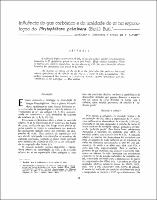Influencia do gas carbónico e da umidade do ar na esporulacao do Phytophthora palmivora (Butl.) Butl.
Abstract
A relatively high concentration of CO2 in the atmosphere inhibits zoosporangium formation in P. palmivora grown in cocoa pod husks. High relative humidity (close to 100 percent) also inhibits sporulation. In the absence of CO2 the most favorable relative humidity for sporulation was found to be 80 percent. The practice of pilling up the husks in the field after the pods are harvested reduces sporulation in the interior of the pile as a result of CO2 accumulation. The authors recommend this practice as a protective measure against sporulation and dissemination of the pathogen.
Keywords
Phytophthora palmivora||Phytophthora palmivora||Phytophthora palmivora||Phytophthora palmivora, Theobroma cacao||Theobroma cacao||Theobroma cacao||Theobroma cacao, Enfermedad fungosa||fungal diseases||doença fúngica||maladie fongique, Esporulación||sporulation||esporulação||sporulation, Aire||air||ar||air, Humedad||humidity||humidade||humidité, Carbono||carbon||Carbono||carbone,
Delegation
Sede Central
Publisher
Instituto Interamericano de Ciencias Agrícolas (IICA)
Is part of
Turrialba; Vol.17, no. 1
Status
openAccess
URI (Permanet link to cite or share this item)
https://repositorio.catie.ac.cr/handle/11554/13459Collections
- Turrialba [2688]


